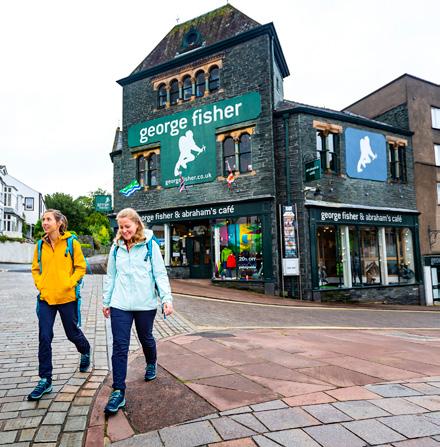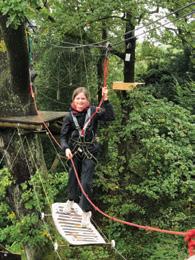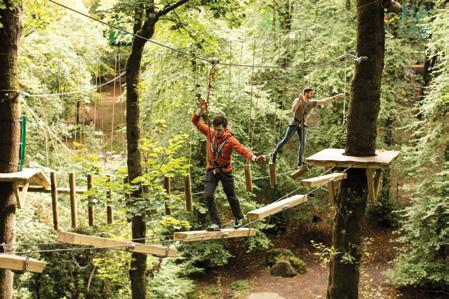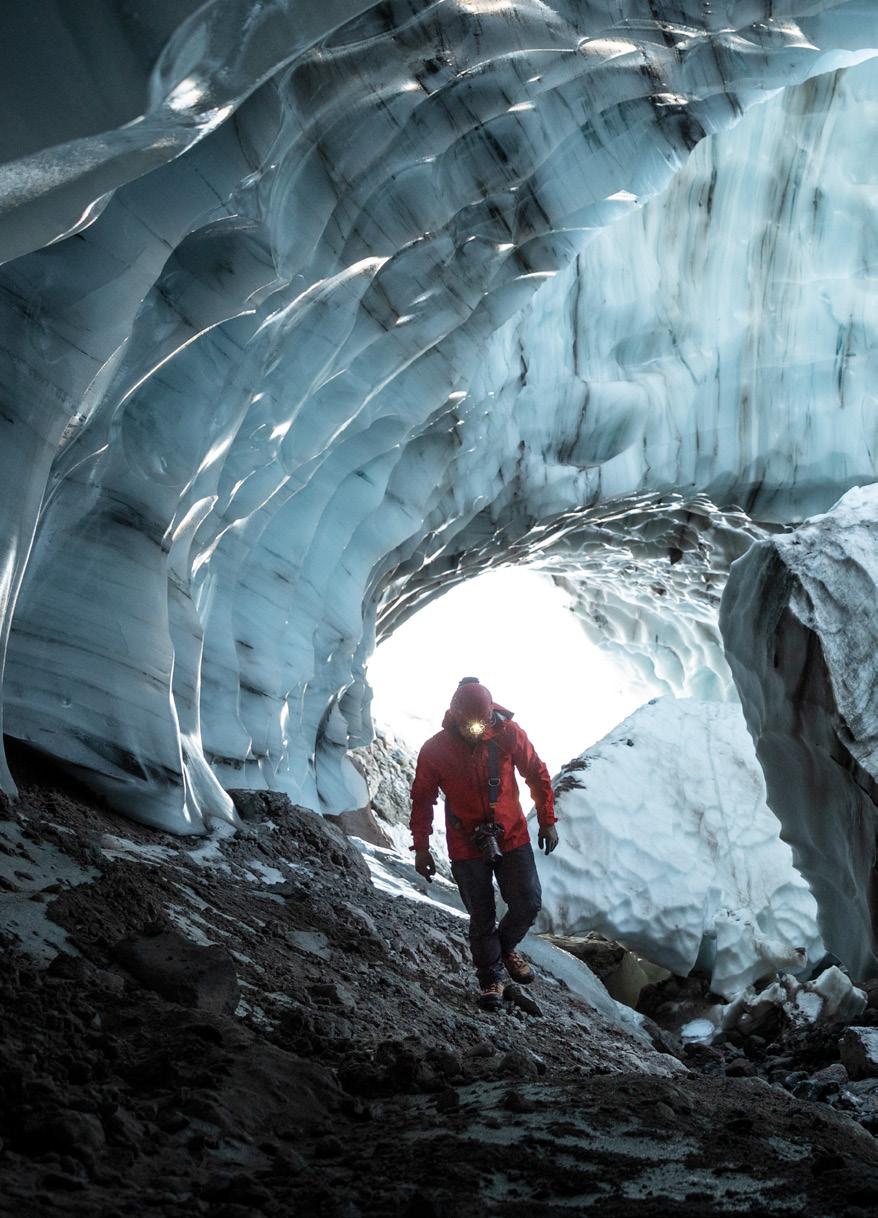






EXPLORING CREATIVITY AND CONNECTION IN LANDSCAPE, NATURE, PEOPLE AND PLACE

WITH THANKS TO OUR PARTNERS
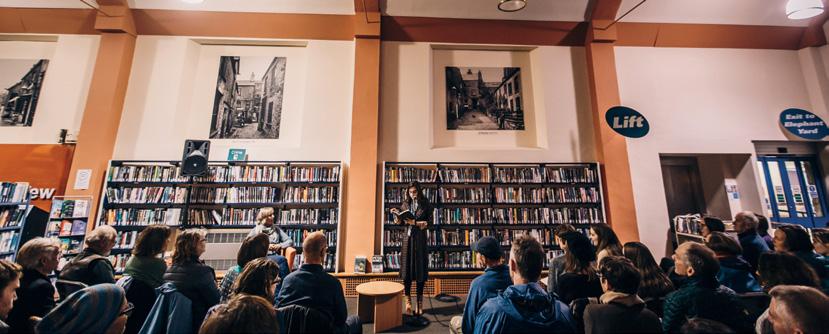
This year’s Festival theme is centred around ‘nurture’. Our connection with the natural world is more than a luxury: it is vital to our hearts, lives and health. The stories we tell can shape the future, politically as well as emotionally, for the better. To communicate with nature and landscape in a way that keeps us rooted and adventurous whilst caring and protecting.
Our Literature Festival Director, Paul Scully says, “Our Festival is a place where we can reflect on our relationships with nature, landscape, society and to each other. A space where people are challenged to be receptive to different ways of thinking, feeling, and behaving. We hope you are able to join us, no matter who you are, in this wonderful community of ideas, words and wanderings.”
Join us on a journey around the world through this year’s best writing exploring landscape, nature, people and place. Our hosts will be in conversation with some of the biggest names in outdoor writing from our studio here in Kendal. We will take you from Cumbrian valleys to Icelandic glaciers, from Britain’s magical landscape to the foothills and summits of the Himalayas and beyond. And we never leave the dog behind....
A new voice in mountain and outdoor literature, ‘Open Mountain’ returns for its second year. Following a call out for submissions, we will be presenting selected pieces of written work as chosen by our judges. A panel led discussion with performance prose and poetry, our event will showcase people under-represented in the outdoors.
With over 30 events, journey with us in this wonderful community of writing, wanderings and wonder from the comfort of your armchair. Look forward to seeing you there!
Let us also take this opportunity to thank our patron, Robert Macfarlane for his unwavering support – we’re delighted he will be joining us for a special free event on The Lost Spells
Thanks also to our presenting partner Danner, and our support partners Woolpower, George Fisher, John Muir Trust and Tree Top Trek.
A full Literature pass (£37.50) will give you access to all of the events over the following pages (except for the Nature Writing Workshop). Individual events are priced at £5.50. Available to watch n demand until 31 December.
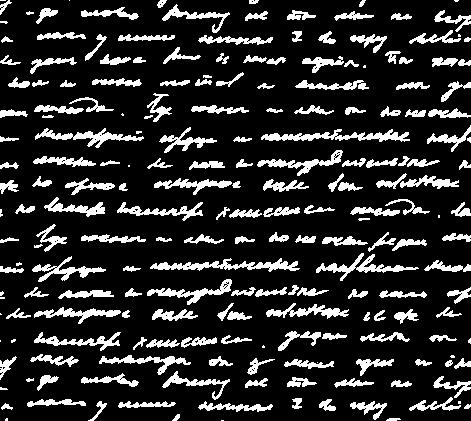
PROUDLY PRESENTED BY SUPPORTED BY

Last spring, as lockdown confined our lives, millions of us listened with new ears and saw with new eyes. Citydwellers woke each morning to a deafening dawn chorus, with the birdsong no longer masked by traffic noise. Londoners realised they lived in a city that was also a wildwood, with almost a tree for every inhabitant. Unable to move, we thirsted for nature -- and found it closer to home than ever before, and more powerful than ever in its solace, its distraction, and in the sheer damn hope it gave us, when hope was hard to come by. Among the forms of good that may come from this roughest of years is surely a greater understanding of what might be called mutualism -- that is, the qualities of co-operation, reciprocal support and kindness which sustain communities when danger and hardship come knocking.
Throughout this year, I’ve held Bertolt Brecht’s lines from 1939 in mind: “Will there be singing in the dark times? / Yes, there will be singing about the dark times.” This year’s Festival is full of songs about the dark times, is rich with stories of nature’s nurture, and of care extended across borders, time-zones, differences and distances. Online events lose in immediacy but they gain in inclusivity. People who would never otherwise be able to attend a festival event in person can this year come together in our audiences from all round the planet -- and that is hugely to be valued. So please, join us from wherever you are in the world, to celebrate openness, kindness and the powers of art and nature to bring people together.
We’re thrilled to bring you three FREE events:
Open Mountain: Space And Isolation
The Lost Spells with Robert Macfarlane and Jackie Morris Dara McAnulty’s Diary Of A Young Naturalist

PROUDLY SUPPORTED BY THE JOHN MUIR TRUST
Open Mountain is a new voice in mountain and outdoor literature. A panel discussion with performance prose and poetry, our event showcases people under-represented in the outdoors.
The first Open Mountain event ‘inclusion and connection’ was held at Kendal Mountain Literature Festival, 2019. Created out of a discussion with the poet Kate Davis we then developed it with the help of poet Polly Atkin and writer Anita Sethi. We sought submissions from people who consider themselves under-represented in mountain and outdoor literature, asking for responses to some questions about how they felt about the outdoors and nature writing.
We were overwhelmed and deeply impressed by the breadth, range, and quality of work submitted, and wished we could include more of it.
We were delighted to invite to the stage: CMarie Fuhrman - co-editor of Native Voices, an anthology of Native American poetry, writer Claudine Tuotuongi, poet Asim Khan, walking guide and writer Ange Harker and author Kate Davies.
Open Mountain as a project is focused on inclusion in and connection with wild places, and on redefining mountain literatures and cultures to include voices and experiences often excluded or invalidated. This year the phrase Open Mountain has taken on other connotations. The pandemic has thrown into sharp relief existing inequalities, including inequalities in access to green spaces and wild places, and access to literature and cultures around them.
The barriers to access that can block marginalised people from the mountains were expanded by lockdowns and shelter-in-place orders. In some places only those who live and work in and amongst the mountains could access them, whose experiences of rural life and work are rarely heard. Some people locked-down in urban centres found themselves with no access to green spaces at all, whilst others have found new joy in their local surroundings. Some people found themselves disallowed from leaving their homes. Some people found their homes were unsafe. Some people have been forced to take to the streets to ask for protection for Black lives. Some people have been forced to isolate completely to try and protect their lives. People have been forced to choose between isolation and togetherness: to second-guess which is most dangerous, which is most safe.
We want to open conversations about how we live with and in places in extraordinary as well as normal circumstances. We want to question what normal is, and what it could be.
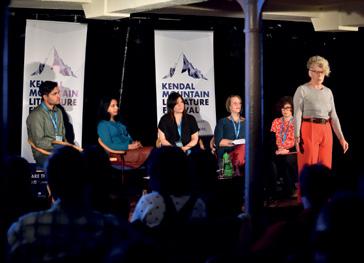
by night birmingham is my apocalypse an isle to rising seas breached by the surf of floating copses conifers whispering this heat is bleak
in these lone walks through its quiet ends come the prayers to gods of the triassic moist breaths that seep from concrete coffins filled with microplastics and desiccated leaves is this the path of carbon hunger the itch of unresolved anxiety smoke that splits bridges reverberations passed through sacrum and sternum
is this streetlight solipsism that undresses political sutures // a landscape that both stings my colour and sings my annihilation //
birmingham by morning my revelation a chorus of invisible birds through refrains of visible winds
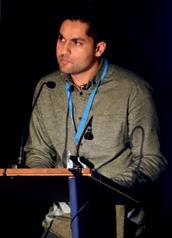
People need to be able to recognise themselves in narratives about places to find a place in them, and to believe they can have a place in and with them.
Open Mountain hopes to show what is already there, but often not seen: the rich and various connections people have with mountains and wild landscapes, and the rich and various worlds they find within them.
We hope you will join us. This is a free event taking place live on Saturday 28th November at 1pm.



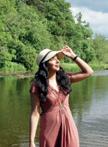
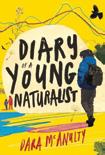
19.00 - 20.00 THURSDAY 19 NOVEMBER
The badass adventurers in this collection are all fearless, intelligent, compassionate and curious about the world – and they all happen to be female. Let yourself be inspired by their stories of grit, courage, determination, triumph and heartbreak.
20.30 - 21.30 FRIDAY 20 NOVEMBER
Raynor Winn shares her luminous story of hope triumphing over despair, of the human spirit’s instinctive connection to nature, and of lifelong love prevailing over everything. After walking 630 miles homeless along The Salt Path, returning to normality is proving difficult - until an incredible gesture by someone who reads their story changes everything: A chance to breathe life back into a beautiful but neglected farmhouse nestled deep in the Cornish hills; rewilding the land and returning nature to its hedgerows becomes their new path.
10.00 - 12.00 SATURDAY 21 NOVEMBER
This session will introduce you to nature writing, with tutor Anita Sethi. You’ll explore how to observe and describe the natural world. The relationship between people and place, landscape, wildlife, climate change, natural history and more can all be explored within nature writing. Anita Sethi is an award-winning writer, journalist and critic.
13.00 - 14.00
SATURDAY 21 NOVEMBER
Winner of the 2020 Wainwright Prize, Diary of a Young Naturalist chronicles the turning of Dara McAnulty’s world, from spring to summer, autumn to winter, on his home patch, at school, in the wild and in his head. Evocative, raw and beautifully written, this very special book vividly explores the natural world from the perspective of an autistic teenager juggling homework, exams and friendships alongside his life as a conservationist and environmental activist.
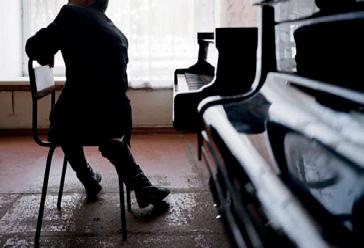
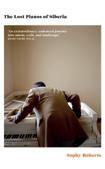
14.30 - 15.30 SATURDAY 21 NOVEMBER
Join Sophy Roberts on an adventurous, moving and revealing exploration of the Siberian landscape blended with humanity, music and memories. Siberia’s story is traditionally one of exiles, penal colonies and unmarked graves. Yet there is another tale to tell. Dotted throughout this remote land are pianos - grand instruments created during the boom years of the nineteenth century, and humble, Sovietmade uprights that found their way into equally modest homes. They tell the story of how, ever since entering Russian culture under the influence of Catherine the Great, piano music has run through the country like blood..

16.30 - 17.30 SATURDAY 21 NOVEMBER
Our evolutionary ancestors swam for survival. Now we swim in freezing Arctic waters, wide channels, and piranha-infested rivers just because they are there. Swimming is an introspective and quiet sport in a chaotic age. It is therapeutic for those who are injured and it is one route to that elusive, ecstatic state of Flow. Propelled by stories of polar swim champions, a Baghdad swim club, Olympian athletes, modern-day samurai swimmers and even an Icelandic fisherman who improbably survived a six-hour swim in the wintry Atlantic, Why We Swim takes us around the globe in a remarkable, all-encompassing account of the world of swimming...
19.00 - 21.00 SATURDAY 21 NOVEMBER
Established in 1983 to commemorate the lives of Peter Boardman and Joe Tasker, the Boardman Tasker Charitable Trust celebrates their legacy by presenting the annual Award for Mountain Literature, presented to the author of an original work, which has made an outstanding contribution to mountain literature. Hosted by Stephen Venables with readings from the authors, and the announcement of the winner by the Chair of Judges Katie Ives. For more detail on the Boardman Tasker Award, see page 68.
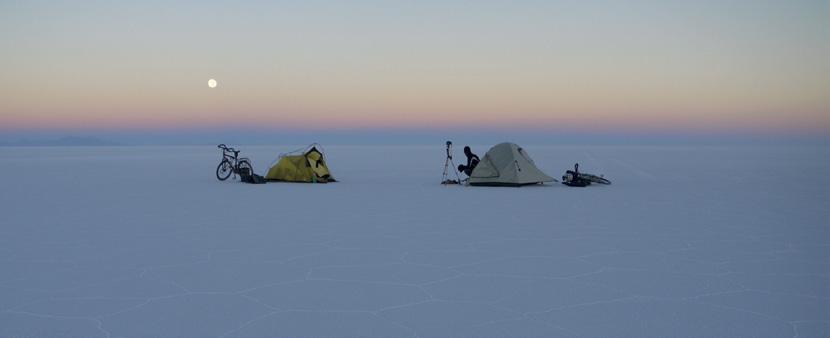
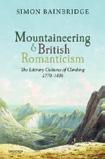
SIMON BAINBRIDGE MOUNTAINEERING AND BRITISH ROMANTICISM
11.30 - 12.30 SUNDAY 22 NOVEMBER
Cumbria was a key location in the invention of mountaineering in the late eighteenth and early nineteenth centuries. In this session, Simon Bainbridge will discuss the early evolution of mountaineering in the Lakes, drawing on the research in his new book Mountaineering and British Romanticism: The Literary Cultures of Climbing, 1770-1836
Simon discusses the growing popularity of mountain climbing in the period, the role of the poets Coleridge and Wordsworth in the development of mountaineering, and the pioneering exploits of female climbers including Dorothy Wordsworth, Ellen Weeton and the Smith sisters of Coniston.
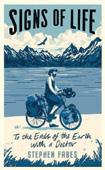

STEPHEN FABES SIGNS OF LIFE: TO THE ENDS OF THE EARTH WITH A DOCTOR
13.00 - 14.00 SUNDAY 22 NOVEMBER
Stephen Fabes, a medical doctor, recounts his cycle around the world and speaks about how societies treat their most vulnerable, in this thought-provoking and witty medical odyssey. As Stephen crossed continents – on a journey that would take six years and cover more than 53,000 miles – he finds people whose health has suffered through exile, stigma, or circumstance and others, whose lives have been saved through kindness and community.
JESSICA J. LEE, DASOM YANG & PEMA MONAGHAN THE WILLOWHERB REVIEW
14.30 - 15.30 SUNDAY 22 NOVEMBER
The Willowherb Review is a ground breaking literary journal dedicated to diversity in nature writing, publishing emerging & established writers of colour. We are delighted to welcome back the founding editor, Jessica J. Lee and contributors Dasom Yang and Pema Monaghan to showcase their exciting new work. Dasom Yang is a writer and translator from South Korea, now living in Berlin, she studied creative writing in Ohio and Dublin. Pema Monaghan is a Tibetan-Australian writer and journalist living in London.

PETER GOULDING SLATEHEAD: THE ASCENT OF BRITAIN’S SLATE-CLIMBING SCENE
16.00 - 17.00 SUNDAY 22 NOVEMBER
Part creative non-fiction, part memoir, part sports documentary, Slatehead is set in both Thatcher’s Britain and the present day. It conveys not only a climber’s passion for the quick-drying slate slopes but also his love for his friends and the punks who first created the climbs. The slate quarries were walking distance; they’d have a smoke, a party in an abandoned hut, try and climb something. A small culture emerged of punks, nutters, artists and petty thieves, crawling up abandoned rock, then heading to the disco at the Dolbadarn. These were the Slateheads.
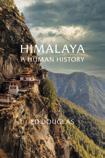
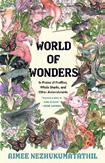
17.30 - 18.30 SUNDAY 22 NOVEMBER
This is the first major history of the Himalaya: an epic story of peoples, cultures and adventures among the world’s highest mountains. Spanning millennia, from its earliest inhabitants to the present conflicts over Tibet and Everest, Himalaya is a soaring account of resilience and conquest, discovery and plunder, oppression and enlightenment at the ‘roof of the world’.
19.00 - 20.00 SUNDAY 22 NOVEMBER
As a child, Aimee Nezhukumatathil called many places home: the grounds of a Kansas mental institution, where her Filipina mother was a doctor; the open skies and tall mountains of Arizona, where she hiked with her Indian father; and the chillier climes of western New York and Ohio. But no matter where she was transplanted, she was able to turn to our world’s fierce and funny creatures for guidance. Even in the strange and the unlovely, Nezhukumatathil finds beauty and kinship.
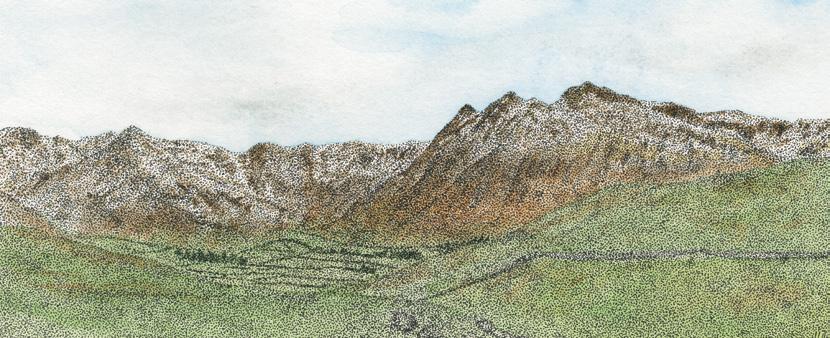


20.30 - 21.30 SUNDAY 22 NOVEMBER
Charged with drama and beauty this memorable collection weaves a magical world of possibility and power from female myths of physical renewal creation and change. An extraordinary immersion into the bodies and voices, mindscapes and landscapes, of the shape-shifting women of our native folklore. Drawing on myth and fairy tales found across Europe – from Croatia to Sweden, Ireland to Russia – Sharon Blackie brings to life women’s remarkable ability to transform themselves in the face of seemingly impossible circumstances.
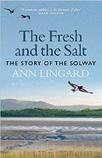

19.00 - 20.00 MONDAY 23 NOVEMBER
Firths and estuaries are liminal places, where land meets sea and tides meet freshwater. The Solway Firth – the crooked finger of water that both unites and divides Scotland and England – is a beautiful yet unpredictable place and one of the least-industrialised natural large estuaries in Europe. Its history, geology and turbulent character have long affected the way its inhabitants, both human and non-human, have learnt to live along and within its everchanging margins.
20.30 - 21.30 MONDAY 23 NOVEMBER
Inspired by the concept of the Gerry Charnley Round and its journey over the Lakeland fells, runners Geoff Cox and Heather Dawe have each spent time recceeing and running the route. Poets, writers and artists as well as fell runners, Traceless is a collaboration between them that celebrates their love for the fells and how spending time in them inspires them creatively. The ethos of the Round is on selfsufficiency and leaving no trace – the runner is encouraged to plan their own route to visit all the checkpoints, then navigate that route, creating their own line from multiple route choices.
Pictured
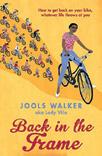
19.00 - 20.00 TUESDAY 24 NOVEMBER
Jools Walker re-discovered cycling aged twentyeight after a ten-year absence from the saddle. When she started blogging about her cycle adventures under the alias Lady Vélo, a whole world was opened up to her. Shortly after getting back on two wheels, Jools was diagnosed with depression and then, in her early thirties, hit by a mini-stroke. Yet, through all of these punctures, one constant remained: Jools’ love of cycling. In Back in the Frame Jools talks to the other female trailblazers who are disrupting the cycling narrative as well as telling the story of how she overcame her health problems, learned how to cycle her own path and even found a love of Lycra shorts along the way.


20.30 - 21.30 TUESDAY 24 NOVEMBER
Conservationist Laurence Rose spent two years exploring the cultural roots of our relationship with nature in order to map out its future. From the white-tailed eagles of Orkney and Mull to the world of ants and crickets on the southern heaths, he describes his encounters with wildlife in exquisite language and vivid detail. A book about the complexity and vulnerability of nature, and the unexpected connections between people and wildlife.
BERNADETTE MCDONALD WINTER 8000
19.00 - 20.00 WEDNESDAY 25 NOVEMBER
Of all the games mountaineers play on the world’s high mountains, the hardest – and cruellest – is climbing the fourteen peaks over 8,000 metres in the bitter cold of winter. Ferocious winds, freezing temperatures, weeks of psychological torment: these are adventures for those with an iron will and a ruthless determination. Award-winning author Bernadette McDonald tells the story of how Poland’s ice warriors made winter their own, perfecting what they dubbed ‘the art of suffering’ as they fought their way to the summit of Everest in the winter of 1980 – the first 8,000-metre peak they climbed this way but by no means their last.


20.30 - 21.30 WEDNESDAY 25 NOVEMBER
The vast majority of our country is entirely unknown to us because we are banned from setting foot on it. By law of trespass, we are excluded from 92 per cent of the land and 97 per cent of its waterways, blocked by walls whose legitimacy is rarely questioned. But behind them lies a story of enclosure, exploitation and dispossession of public rights whose effects last to this day. Join Nick Hayes on a series of ramblings and sketchings around England whilst highlighting the fact that there is no way enough footpaths.

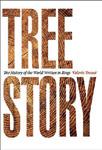
TREE STORY
19.00 - 20.00 THURSDAY 26 NOVEMBER
Children around the world know that to tell how old a tree is, you count its rings. Few people, however, know that research into tree rings has also made amazing contributions to our understanding of Earth’s climate history and its influences on human civilization over the past 2,000 years. In her captivating new book, Valerie Trouet shows readers how the seemingly simple and relatively familiar concept of counting tree rings has inspired far-reaching scientific breakthroughs that illuminate the complex interactions between nature and people.

20.30 - 21.30 THURSDAY 26 NOVEMBER
In the 1930s, as official government expeditions set their sights on conquering Everest, a little-known World War I veteran named Maurice Wilson conceived his own crazy, beautiful plan: he would fly a Gipsy Moth aeroplane from England to Everest, crash land on its lower slopes, then become the first person to reach its summit - all utterly alone. Wilson didn’t know how to climb. He barely knew how to fly. But he had pluck, daring and a vision - he wanted to be the first man to stand on top of the world. An unforgettable story about the power of the human spirit in the face of adversity.
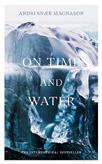
19.00 - 20.00 FRIDAY 27 NOVEMBER
Helen Mort sets out to understand the singular relationship between dogs, mountains and the people who love them. Along the way, she meets search and rescue dogs, interviews climbers and spends time on the hills with hounds. The book is also a personal memoir, telling the author’s own story of falling in love with a whippet called Bell during a transformative year in the Lake District. A compelling account of mountain adventures and misadventures, and the unbridled joy of heading to the hills with a four-legged friend.
20.30 - 21.30 FRIDAY 27 NOVEMBER
Icelandic author and activist Andri Snær Magnason’s ‘Letter to the Future’, an extraordinary and moving eulogy for the lost Okjökull glacier, made global news and was shared by millions. In On Time and Water he attempts to come to terms with the issues we all face: writing of the melting glaciers, the rising seas and acidity changes that haven’t been seen for 50 million years. Taking a path to climate science through ancient myths about sacred cows, stories of ancestors and relatives and interviews with the Dalai Lama, Magnason allows himself to be both personal and scientific. The result is an absorbing mixture of travel, history, science and philosoph.

11.30 - 12.30 SATURDAY 28 NOVEMBER
Keen to see some of Europe, partners Abi (she/ her) and Lili (they/them) get on their bikes and start pedalling. Along flat fens and up Swiss Alps, they will meet new friends and exorcise old demons as they push their bodies – and their relationship – to the limit.
Abi and Lili, are a queer couple who write, make zines, do art and ride bikes. Gears for Queers is their first book – born out of a series of zines from their first tour.
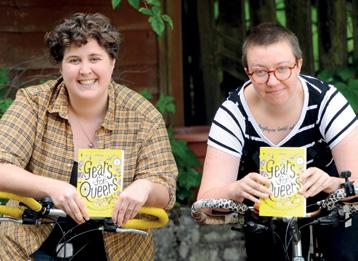
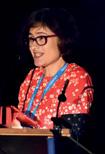
13.00 - 14.30 SATURDAY 28 NOVEMBER
Welcome to the 2nd Open Mountain: a new voice in mountain and outdoor literature. Join us for a panel discussion with performance prose and poetry, showcasing people underrepresented in the outdoors.
Following our open call for submissions, we will be presenting selected pieces of written work as selected by our judges: poets Polly Atkin and Kate Davis and author and journalist Anita Sethi.
Keep an eye on the Kendal Mountain Literature Festival social media for the announcement of this year’s contributors.
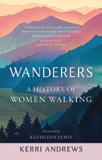
16.00 - 17.00 SATURDAY 28 NOVEMBER
A book about ten women who, over the past three hundred years, have found walking essential to their sense of themselves, as people and as writers. In a series of intimate, incisive portraits, Wanderers traces their footsteps, from eighteenth-century parson’s daughter Elizabeth Carter – who desired nothing more than to be taken for a vagabond in the wilds of southern England – to modern walker-writers such as Nan Shepherd and Cheryl Strayed. A beguiling, alternative view of the history of walking, Wanderers guides us through the different ways of seeing – of being – articulated by these ten pathfinding women.

19.00 - 20.00 SATURDAY 28 NOVEMBER
Alone on a remote mountaintop one dark night, a woman hears a mysterious voice. Propelled by the memory and after years of dreaming about it, Jini Reddy dares to delve into the ‘wanderlands’ of Britain, heading off in search of the magical in the landscape. Whether following a ‘cult’ map to a hidden well that refuses to reveal itself, attempting to persuade a labyrinth to spill its secrets, embarking on a coast-to-coast pilgrimage or searching for a mystical land temple, Jini depicts a whimsical, natural Britain.


20.30 - 21.30 SATURDAY 28 NOVEMBER
Losing Eden is an enthralling journey through new research, exploring how and why connecting with the living world can so drastically affect our health. Travelling from forest schools in East London to the Svalbard Global Seed Vault via primeval woodlands and Californian laboratories, Jones takes us to the cutting edge of human biology, neuroscience and psychology, and discovers new ways of understanding our increasingly dysfunctional relationship with the earth. A rallying cry for a wilder way of life – for finding asylum in the soil and joy in the trees – which might just help us to save the living planet, as well as ourselves.

LAKE DISTRICT NATIONAL PARK
13.00 - 14.00 SUNDAY 29 NOVEMBER
On the fringes of England’s largest national park, an alternative vision emerges. In late 2017, a walk around the boundary of the Lake District uncovers a hidden landscape consumed by ghosts of nostalgia. Roughly 160 miles where it’s never quite clear where the muddy paths and coastal ridges will lead. Stumbling upon industry as theme park on the border between urban and rural. Welcome to a different ‘place to be’, where the pastoral and sublime rub shoulders with nuclear and second home syndrome – on the edges of Brexit…

14.30 - 15.30 SUNDAY 29 NOVEMBER
In this special event we listen to forgotten folk tales spellbindingly reimagined by some of the best contemporary female writers around. Natasha Carthew, Mahsuda Snaith, Irenosen Okojie and Imogen Hermes Gowar join Polly Atkin to discuss their engaging modern fables with a feminist bite. From the islands of Scotland to the coast of Cornwall, the mountains of Galway to the depths of the Fens, these forgotten folktales howl, cackle and sing their way into the 21st century!
19.00 - 21.00 SATURDAY 21 NOVEMBER
On 17 May 1982 Peter Boardman and Joe Tasker were last seen on Mount Everest attempting to traverse The Pinnacles on the unclimbed North East Ridge at around 8250 metres. Their deaths marked the end of their contribution to a remarkable era in British mountaineering. The Boardman Tasker Award highlights afresh the memory of Pete and Joe, but it also seeks to do more than just that. The Award recognises and rewards outstanding literature concerned with the mountain environment: books which will in turn challenge and inspire their readers, perhaps to climb or explore the world of mountains, perhaps to write or perhaps to look at the world in a different way. Perpetuating and refreshing the challenge and inspiration of mountains through literature is one way in which we seek to remember them.
The winner of the Boardman Tasker Award is a book that Pete and Joe would be proud of being associated with.
This year there were 22 books submitted on a broad range of topics, of which the following five have been shortlisted.


A book that transcends the genre of sports memoirs with prose that deftly captures the physical and psychological intensity of ultradistance cycling, as well as the struggles of depression and grief, rejecting inspirational clichés in favour of a complex, honest and profoundly human vision.
An in-depth history of the climbs and characters of British slate quarries that is also a meditation on the nature of obsession, on the persistence of wildness in unexpected parts of a post-industrial world, and on the rock itself, at times sharp, lustrous and strangely beautiful.
The Judging Panel for the 2020 Boardman Tasker Award is:
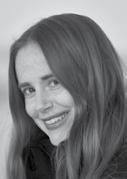
Katie Ives is the editorin-chief of Alpinist and a graduate of the University of Iowa Writers’ Workshop and the Banff Mountain and Wilderness Writing Program. Her stories, essays and translations have appeared in various publications, including The New York Times, the American Alpine Journal and Outside. In 2016 she received the H. Adams Carter Literary Award from the American Alpine Club.




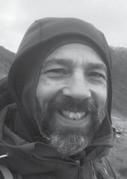
David is a poet from the flat lands of Colchester, Essex, but with a passion for mountains. The only reason why he has not (yet) moved to a more vertiginous part of the world is because he works in the Civil Service in Westminster. However, he gets out to crags and mountains across the UK and Europe as often as he can (the Dolomites are a favourite place), and, as a sideline, works as a climbing instructor at the University of Essex.
A lyrical exploration of Scotland’s regions of “rumor and folklore,” of hidden places and often-forgotten tales, that makes a compelling argument for a greater examination of “wild histories” beyond the most well-trodden narratives of adventure.
An intricately researched biography of a Scottish mountaineer whose contributions to climbing history on Mont Blanc and other mountains have long deserved a close look –and whose life and personality may have contained enigmas as challenging as the routes that he climbed.
A poetic and deeply moving account of Taiwan’s mountains, waters and forests that interweaves the author’s experiences of hiking with recollections of political, cultural and family histories, creating portraits of landscapes haunted by memory and longing.
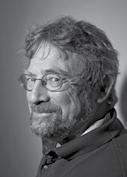
Born in Aberdeen in 1943, physicist and pioneering climber Michael Kosterlitz received his Ph.D. from Oxford University in 1969. Following a period as a postdoctoral researcher at Torino University in Italy - in convenient proximity to the Italian Alps - he became a research fellow at Birmingham University in 1970 before beginning work at Brown University in the USA in 1982. Mike was awarded the Nobel Prize for Physics in 2016.
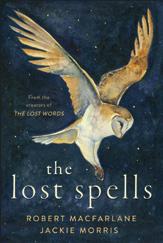
ROBERT MACFARLANE & JACKIE MORRIS
THE LOST SPELLS


17.00 - 18.00 SUNDAY 29 NOVEMBER
Join Robert Macfarlane and Jackie Morris for a magical hour where we discover the Lost Spells, read them aloud, wonder at the artwork and celebrate nature. ‘The Lost Spells’ is a pocketsized treasure that introduces a beautiful new set of natural spell-poems and artwork. Each “spell” conjures an animal, bird, tree or flower – from Barn Owl to Red Fox, Grey Seal to Silver Birch, Jay to Jackdaw – with which we share our lives and landscapes. Moving, joyful and funny, ‘The Lost Spells’ above all celebrates a sense of wonder, bearing witness to nature’s power to amaze, console and bring joy.

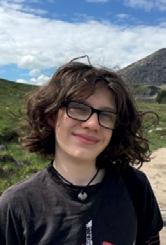
DARA MCANULTY DIARY OF A YOUNG NATURALIST
13.00 - 14.00 SATURDAY 21 NOVEMBER
Winner of the 2020 Wainwright Prize, ‘Diary of a Young Naturalist’ chronicles the turning of Dara McAnulty’s world, from spring to summer, autumn to winter, on his home patch, at school, in the wild and in his head. Evocative, raw and beautifully written, this very special book vividly explores the natural world from the perspective of an autistic teenager juggling homework, exams and friendships alongside his life as a conservationist and environmental activist.
“I was diagnosed with Asperger’s/autism aged five… By age seven I knew I was very different, I had got used to the isolation, my inability to break through into the world of talking about football or Minecraft was not tolerated. Then came the bullying. Nature became so much more than an escape; it became a life-support system.”
Dara McAnulty

